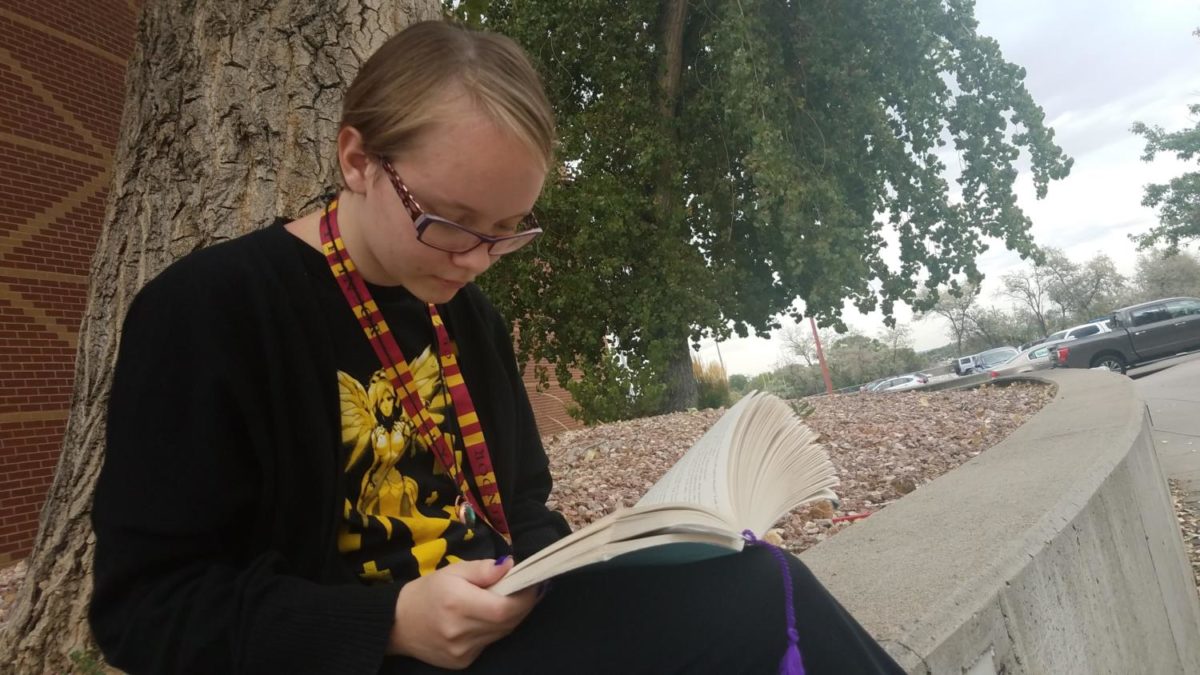Behind The Stage
October 3, 2017
Golden lights dim, velvet red curtains fall. Shows over.
The cast comes back on stage for a final bow. The crew stays backstage, proud of the work they have done. They may not be glorified in those lights, showered with applause and flowers, but the impressed warmth from the audience is for them as well for the cast.
In the small crowd of black clad kids, there stands the stage manager, breathing a soft sigh of relief. They work harder than everyone else, shouldering the most pressure for every show the theater works on. They must balance school work, family life, and the long hours dedicated to the thespians.
Beatrice Shaw (Junior) is the thespians new stage manager. Their job consists of assisting the crew with lines and placement, making sure the lights and music are on time. Bea works hard to keep up good grades and stays after school every day from four to eight for theater.
Bea never started out in a high position. In fact, they worked mostly on set in their freshman year; they learned how to paint and put together scenery. Sophomore year, they were chosen to be assistant stage manager, or ASM, by Hannah Tripp. In that position, Bea learned how to take the reigns and handle shouldering multiple things all at once. When Hannah graduated, Bea took her place and now works even harder than they used to. With big shoes to fill, everyone says they are taking those steps Tripp left and filling the position perfectly. Bea says it’s a lot of work, but it’s worth it because theater means so much to everyone.
“Forgive, forget, and love,” this is how Alora Folmar, a crew member, described theater and everyone in it. Everyone is just one big family, though loosely connected at times. Theater always pulls together and puts on an amazing show. Each part of theater needs the other, without the thespian president, the stage manager couldn’t handle everything as well as they do and vice versa.
Crew and cast need one another even when it seems at times that one works harder or one is more important than the other. Beatrice is a good example of uniting the theater and settling conflicts between thespians. As stage manager, they stand between cast and crew, organizing both and keeping everyone from becoming a hot mess.
Bea has an impeccable work ethic, which has shown through to their fellow peers. Beth Haman, a crew member who works primarily on sound, said that “[Beatrice] works really hard and has a lot of commitment to the job.” Multiple theater kids notice the pressure and stress placed on them as stage manager. Bea’s perseverance and commitment derived from Bea’s mother, who works just as hard as they do with a night job and craft fairs to raise money.
Frazzled and holding all the strings of a play together, Bea has no time to care about the judgments made about them and fingers pointed their way. They have much more important tasks to worry about. They work hard at school, no matter how much they claim they are over it; Bea gives all their jobs in life more than one hundred percent.
This moral of hard work and perseverance is what has made a fellow cast member, Rebecca Decker, say that “My goodness, they work harder than anyone else… they have to be there.” Without the stage manager, the pressure of show week would be too harsh and small rivalries between cast and crew could explode.
Even with that pressure, the stage manager handles their job with grace and a firm hand. When production week comes around, everyone’s strings are frayed from distress, chaos creeps into the rehearsal doors and stalks the stage. Bea is responsible for keeping everyone calm, they are the nexus of cast and crew, the calmness in a thunderstorm.






